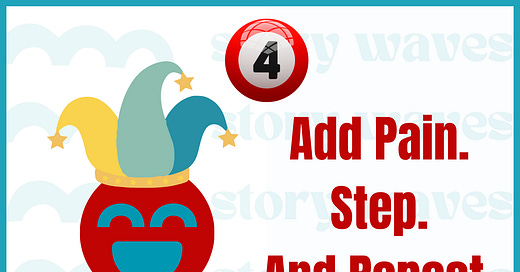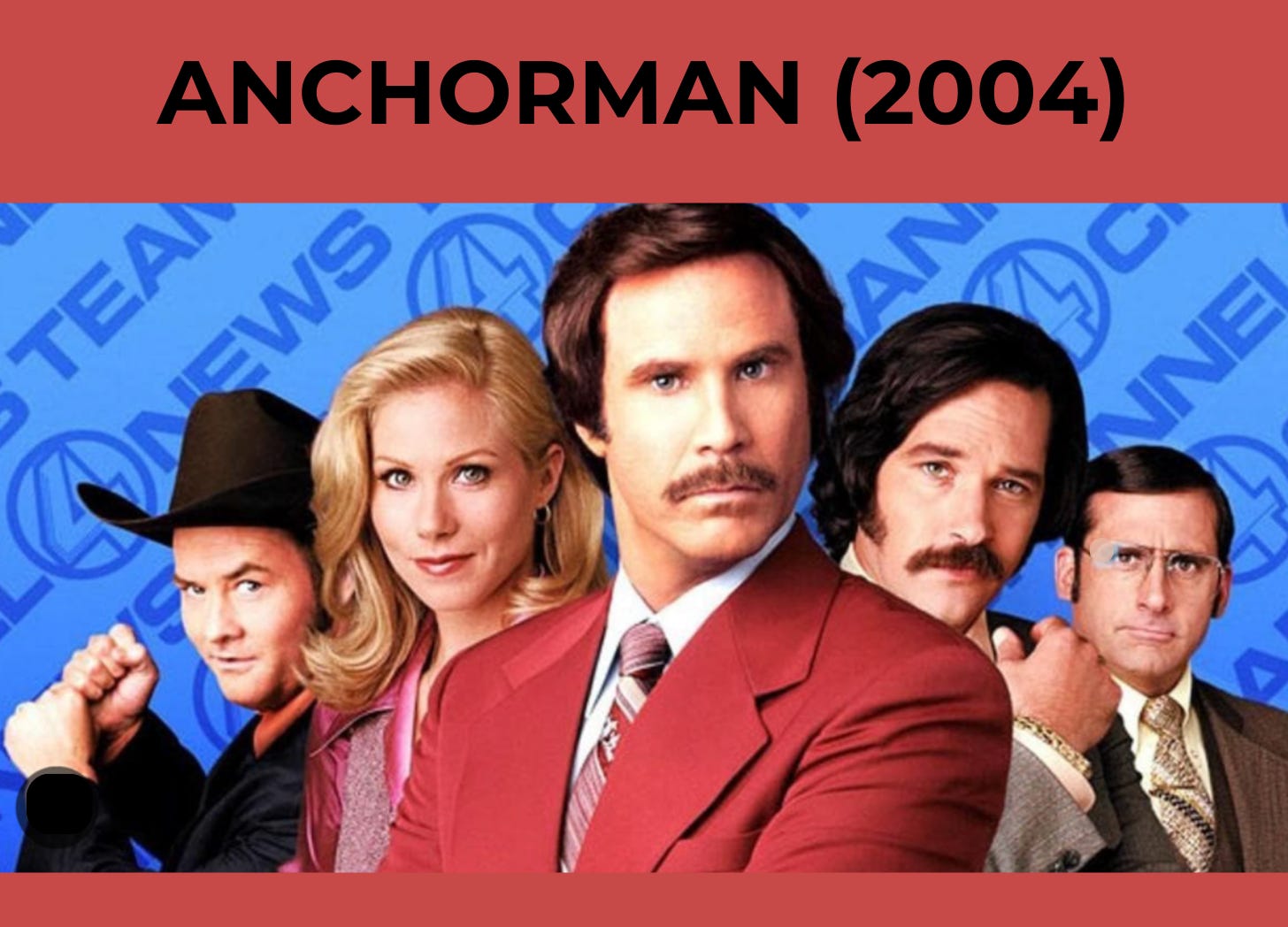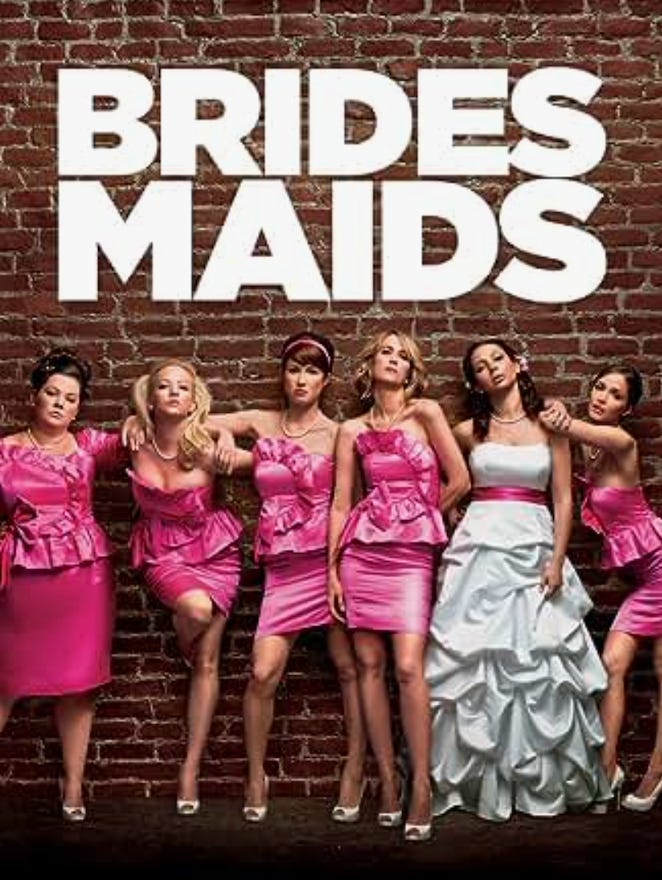Add pain.
Step.
And repeat.
Add pain throughout the structure, whether your story is a drama or comedy.
If it's a comedy, make it a comedy all the way through. Keep the comedy consistent.
This post is about adding pain as comedy in all the right places: THE STRUCTURE.
Comedy is…
pain.
not normal.
unexpected and the opposite.
exaggeration.
brief.
I write the structure first. Character second.
Plot the PAIN (comedic scenes/set pieces) into your main story structure beats first.
Build comedy through characterization (jokes/best lines) second.
Where to put the comedy into structure?
Comedy is also repetition. Keep the audience laughing by adding PAIN/COMEDY to the major structure tent poles:
1. Opening: Hook the audience, set the tone with a "show-don't-tell" scene
2. Setup: Show the character’s comedic POV with a strong introduction
3. Inciting incident: The character experiences a painful event that changes them
4. End of Act I: The character refuses to go after what they want, causing more pain until they must pursue their goal, no matter how far-fetched the situation
5. Beginning of Act II: Add jokes and comedic set pieces
6. Midpoint Twist: Add painful twists that blindside your main character
7. End of Act II: Add the most loss and pain
8. Beginning of Act III: Add false hope of the future or pre-climax
9. End of Act III: The character reprioritizes their values and changes their mind or behavior, and it leads to a happy ending with more pain to come
PITCHING TIP: Adding comedy/pain into the main structure tent poles is your road map to pitching the "comedy" in your story to execs, lit managers, and agents.
Open with Pain
Page one must be painfully funny. The opening, pages 1-3, sets the tone and shows the character's skewed point of view.
SPY (2015) is a spy, action, and comedy film written and directed by Paul Feig. In the opening scene, Melissa McCarthy, an every-woman CIA operative in the office, whispers in Agent Fine’s (Jude Law) earpiece—a handsome spy out in the field—directing him through a suspicious doorway at a swanky mansion party.
Busting a door open, Agent Fine nails a bad guy in the face, winks at a flock of females, flicks back his slick hair, and the oh-so-adorable "Fine" swanks off, stumbling into more danger.
Thanks to Melissa's top-notch guidance, Jude escapes being blown up in a motorboat getaway, telling her he could kiss her. When Melissa says she would accept that kiss with an open mouth, the audience knows that this "underdog meets alpha dog" comedic/painful tone will be the glue that ties all three genres together.
Insert Comedy and Pain into the Setup and Character Introductions
The setup is where you put effort into introducing your character's skewed (not normal) POV about their world and what they want, based on their weakness/need.
Melissa McCarthy's character wants to stop the bad guys from killing Jude Law because she's madly in love with him. In a fancy restaurant, he gifts Melissa with a cake pendant complete with an adjustable strap. Like any girl, she expected a ring.
The non-traditional jewelry gag is humiliating and painfully funny. Melissa McCarthy heightens the comedy when she gets intimate in a crowded restaurant, draping her voluptuous body over the table to hold Jude's hands. She is in love 100% with a man she can't have, and although it's sad, it's super funny.
To recap, write strong character introductions in the opening and setup. In comedy, kick your main character’s butt by exposing their deepest desires and how they are nowhere near attaining them.
Each supporting character should have a specific personality, point of view, and attitude that will amplify conflict and pain with the main character.
Inner and outer conflict is pain, so any conflict is comedy.
“Oh. It’s not a ring?”
Inciting Comedy and Pain in the Inciting Incident
In the inciting incident, whip a monkey wrench into the mechanical workings of your main character's world. Turn their topsoil upside down and uncover the main character's weakness/need (for example, the need to be loved or rich) by showing us what they deeply and secretly desire to fulfill that black hole in their heart.
As the main character faces that upheaval moment (inciting incident), there is a field of possibilities to make fun of your character by putting them outside their comfort zone and showing their true vulnerability.
In ANCHORMAN (2004), Ron Burgundy, played by Will Ferrell, is San Diego's leading anchorman, and he's shocked when he finds his top-ranking position threatened when the very beautiful Veronica Corningstone joins the Channel 4 news team.
The secret to finding funny in a scene: Know your story's main ACTION (win | escape | stop | retrieve) and add it to your theme (for ex., identity).
In ANCHORMAN, the story's action is WIN, and the theme is GENDER IDENTITY.
What could go wrong when it comes to the sexes battling for top anchor in the news room?
As a female shakes his once unassailable perch, Ron Burgundy is compelled to reevaluate the male-dominated culture he has grown accustomed to. There's nothing more opposite than the point of view between the male and female in this comedy. Putting them in the same room is where the conflict lights the match to their pain and their romance.
Ending Act I with Comedy and Pain
THE HANGOVER (2009) follows a group of guy friends who wake up in a Las Vegas hotel without remembering the previous night's events and discover a Bengal tiger in their hotel room.
The end of Act I reveals shocking and humorous revelations about their wild night:
During their wild bachelor party, the guys broke into the tiger's cage
Put a leash on the tiger
Stuffed the tiger into the stolen cruiser
Snuck the tiger into the hotel and kept it locked in their bathroom
The following day, Alan discovers the tiger in the bathroom
The tiger revelation is a key comedic moment that adds to the overall painful humor and unpredictability as they discover Doug is nowhere to be found—and, oh, yeah, there's a baby in the closet.
They end Act I on a precarious lark (baby + hungry tiger) and launch into Act II.
Getting the Comedy and Pain into Act II
Once into Act II, the main character chases their goal and runs into other characters to throw them off their path. Introducing new characters is an opportunity where you can invite a B story.
The new B storyline and new characters could launch a love story—but it must add more conflict/pain to create more comedy—like when Stu marries a call girl named Jade in THE HANGOVER.
During Act II, it's time to showcase the genre's comedic set pieces. Make the set pieces fresh, funny, and entertaining. Act II is fun for the audience but NOT fun for your main character(s).
The most memorable set piece is in the female-led comedy BRIDESMAIDS (2011), and there are so many great Act II lines in this comedy.
In the iconic barf scene, all the bridesmaids suffer food poisoning except for Kristin Wiig, Annie, and it's her fault that Maya Rudolph, as Lillian, gets diarrhea in the middle of a busy city street in a designer white wedding dress and is forced to take a dump.
DIALOGUE TIP: The comedic set pieces can also launch memorable lines of dialogue.
"I just took a s*** in the middle of the street. I just s***." – Maya Rudolph as Lilian BRIDESMAIDS (2011)
Midpoint reversal and adding the Comedic/Painful twist
One way to add a comedy twist at the midpoint reversal is to change the characters' status unexpectedly. In ANCHORMAN (2004), Ron misses his news reporting slot due to being emotionally trapped in a glass cage following the incident where Baxter is punted. Veronica steps in as the lead anchor to cover for Ron.
Extract comedy from the story structure :
As in the case of ANCHORMAN, all the story structure beats lead up to and reveal everything that could go wrong for Ron Burgundy and Veronica Corningstone using the STORY ACTION of WINNING added to the THEME of true GENDER IDENTITY.
ANCHORMAN
STORY ACTION + STORY THEME = PAIN/COMEDY
WIN + GENDER IDENTITY = Ron Burgandy is upstaged by a woman
Veronica stepping in as the lead anchor to cover for Ron is an unexpected twist of events, resulting in Veronica earning a promotion to co-anchor. Painful for Ron. Funny for us and Ms. Corningstone. However, the promotion becomes a source of tension (rom-com genre) as Ron feels betrayed, causing the unraveling of their romantic relationship.
How to End Act II: All is lost and painfully funny
The end of Act II is the most painful and comedic. The main character must lose what they love the most in the most humiliating public way possible. The first ANCHORMAN movie is full of Will Ferrell's secret sauce.
It’s even more comedic when Veronica sabotages Ron's teleprompter—which Ron reads like a robot—tricking Ron into casually signing off with, "Go fuck yourself, San Diego." Ron is fired from the prestigious news team because of his on-air faux pas, and he starts his spiraling descent into disintegrating into half a man.
Begin Act III with Comedic and Painful pre-climax
In Act III, characters prioritize needs over wants, surmount obstacles, fulfill story arcs, and showcase the main character's personal growth. At the beginning of Act III, the narrative starts with a pre-climax, encompassing events that build up to a climactic confrontation, which is the final climax to the question "How will I get out of this!" (or something close).
This pivotal moment at the beginning of Act III presents the main character with a point of no return, where they must either emerge victorious or face impending peril.
In MEAN GIRLS (2004), Ms. Norbury, played by Tina Fey, is investigated for drugs due to Cady writing falsely about her teacher in the Burn Book.
Teen pain. The worst. Painfully, Cady takes complete responsibility and painfully faces social ostracism from her peers and a lack of trust from her parents.
How is choosing honesty over having no friends funny?
It's satisfying to see Cady join the Mathletes to redeem herself, answering the tiebreaker at the state finals and securing the championship victory. Despite the challenges, Cady undergoes a gradual return to her previous self, and this is where we smile and get relief from the dramatic tension. Lessons learned are funny.
End Act III with heart and comedy
Even though it's a comedy and you're going for comedy all the way through, heart is the key to the comedic success of the whole movie. End the story with the right choice, the love choice, and the comedy will rise to the top.
At the end of ANCHORMAN, as fate would have it, right during the year's most colossal story, Veronica mysteriously vanishes.
Veronica's mysterious disappearance is a fated, painful path that puts the golden ticket of redemption into Ron’s hands—the opportunity to step back into the news reporting spotlight. However, his grand return takes a wild turn when he rushes to the zoo only to find Veronica stuck in the bear pit. Faced with a life-altering choice, Ron prioritizes saving Veronica, the love of his life, over the bear-breaking news.
How much pain is in your structure?
Add more Story Waves lessons to your arsenal with our monthly Workshops on structure and genre.
Check out Story Waves Lessons:
Why subscribe?
Subscribe now for story waves of insight and creativity! Never miss an update.
Get the discounted $79 ANNUAL subscription or $8/month to receive:
Growing Archive of all Story Wave posts, writing workshops, teaching video, downloadable class notes, and templates
Join Story Waves Writing Challenges
Story Waves Community of writing support and paid posts
Get the discounted $159 FULL ACCESS subscription to receive:
Access to STORY GROUP and work with me every first Sunday of the month, 2-3:30 pm EST, where I demo page rewrites live from volunteers and teach from my Story Waves lessons.
Receive a $100 discount on all Story Consultations.
p.s. Replays will be available for workshops. Watch them at your convenience.
✨ Invest in yourself and your Story! Commit to one year with my guidance and get the discounted annual subscription. You, your writing, and your career are worth it.
Thank you for supporting Story Waves! Consider becoming a paid subscriber and get the benefits of Story Group and Story Consultation discounts. See FULL ACCESS.
I look forward to reading your stories and connecting in 2024!
Best wishes,
Kelly E. Keough












